Join or Sign In
Sign in to customize your TV listings
By joining TV Guide, you agree to our Terms of Use and acknowledge the data practices in our Privacy Policy.
Alice in Borderland Season 2 Ending Explained
The actor who plays the Queen of Hearts shares one key change from the manga
[Warning: The following contains spoilers about the finale of Alice in Borderland Season 2 and the manga ending. Read at your own risk!]
Alice in Borderland Season 2 did not come to play. The thriller has set a record for the most hours viewed in a week on Netflix for a Japanese series. More than 61 million hours were viewed over the show's premiere weekend, according to Netflix, and more viewers are finding the deadly adventures of Arisu (Kento Yamazaki).
After two seasons of watching Arisu and his friends fight for their lives in a mysterious alternate Tokyo, we finally learned why they're in this world in the final episode of Alice in Borderland Season 2 — but not before we were thrown for a wild loop. This has to be one of the most confusing finales we've ever seen, so TV Guide is here to break down exactly what happened.
Alice in Borderland begins with high school student Arisu and his two besties Karube (Keita Machida) and Chota (Yuki Morinaga) — RIP to those two, we're still not over Seven of Hearts and will never get over it — finding themselves in a Tokyo where most humans have disappeared. The three of them, plus other players also trying to figure out what the heck is going on, discover game arenas connected to a deck of cards The suit of the card corresponds to the game type (club means team battle, diamond means wits, spade means strength, and heart means betrayal), and the number corresponds to difficulty. They must win in order to survive, otherwise the players either die in gruesome fashion directly in the games or are lasered to death when their "visa" days run out.
Season 1 ended with all the numbered cards being cleared and the introduction of face cards. In Alice and Borderland Season 2 — which is based on the manga of the same name — Arisu and his will-they-won't-they new BFF Usagi (Tao Tsuchiya) try to win these face card games with the goal of returning to "the real world."
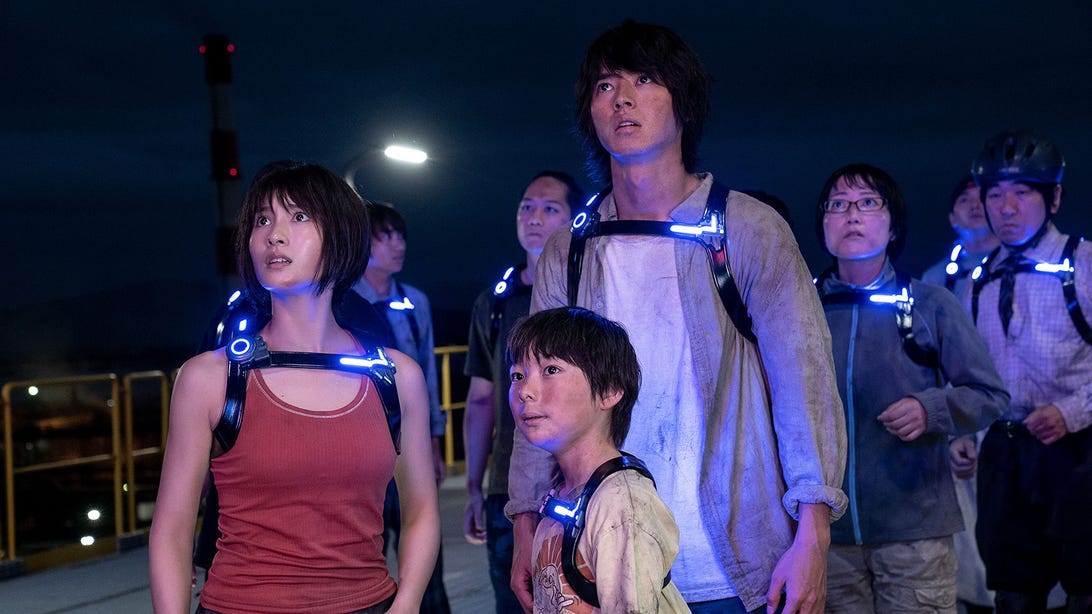
Tao Tsuchiya and Kento Yamazaki, Alice in Borderland
NetflixPlaying the Queen of Hearts
Is it possible to return to "the real world"? That's the question Arisu has been asking all along, and the one he asks in the very last game, the Queen of Hearts. This final challenge is run by Mira Kano (Riisa Naka), who was revealed to be the one orchestrating the games at the end of Season 1. The premise of the Queen of Hearts is oddly straightforward: Arisu has to complete three rounds of croquet — win or lose — without quitting. Arisu and an injured Usagi (who's not participating due to severe injuries from battling the King of Spades) are, like us, extremely confused upon hearing the rules. But it soon becomes clear what Mira is planning.
After two rounds of croquet, Mira insists on having tea. It's here that Arisu once again asks about "the real world," and Mira begins her trickery. She first says that Arisu and all of the players actually come from 1,000 years in the future, and they're playing these games through VR devices. This has all been fictional, in other words. For anyone familiar with apocalyptic worlds, the explanation sounds plausible. But Mira laughs and says, "Just kidding! I lied about all that!" What? She immediately launches into another response: Aliens have captured humanity, and are forcing them to play these games for scientific research. Once again, though, Mira says she's joking. What is going on?
"My game was a mind game, a psychological game and compared to others, which are packed with action and their intensity, my offense was using words," Naka told TV Guide.
Her offense becomes the strongest when she seriously starts to make Arisu question his reality. Mira tells Arisu that the games have all been one big illusion, and that he's suffered from memory loss after watching his two friends Karube and Chota die from a car accident that fateful day in Tokyo before they were all transported into this world. Arisu suddenly finds himself in a clinic, with Mira saying she is his psychiatrist. Meanwhile, Usagi is screaming at Arisu telling him to wake up, but Mira dismisses her by telling Arisu she's another patient who's been hospitalized. While Arisu is experiencing this vision where he's receiving treatment from Mira, the Queen of Hearts probes his deepest fears and regrets about having survived instead of Karube and Chota. Mira says that if she can confirm Arisu's desire to quit, the games will end.
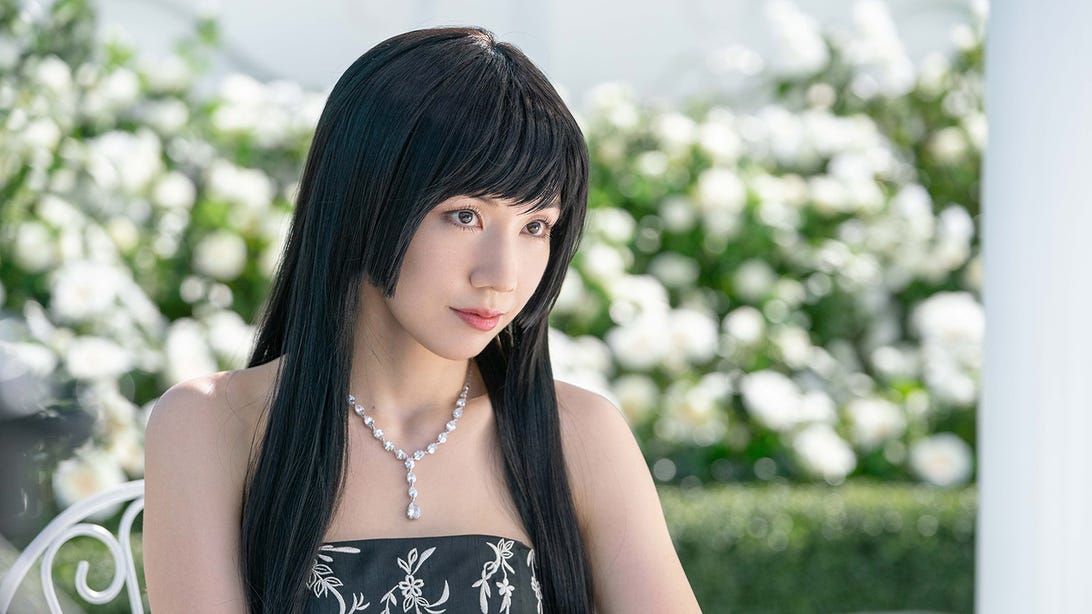
Riisa Naka, Alice in Borderland
NetflixHow was Mira able to get Arisu to believe that he's not at the game arena but at a clinic with her? Fans of the manga will notice one key difference. "According to the original story in the manga, I believe that in the beginning Arisu takes his medication and then he goes into this world of hallucination," Naka said. In the manga, the tea that Mira gives Arisu in between the rounds of croquet is laced with a hallucinogen. "[Shinsuke Sato,] the director said that that's kind of unfair," Naka said. "Mira is the master of all these games, she's the key figure. Why would she then be borrowing or using the power of science?" The actor shared that the director had doubts about that method, and said she felt similarly. "So we came up with an approach where we would use her words to be more hypnotic and then to drag him from this reality to this hallucinatory stage."
This way, the effects on Arisu are not caused by drugs but rather by a type of "psychic power" that Mira has, Naka explained. "But then during that, Usagi is the one who saves him because of their friendship or love. She's able to do so and then in the end they have this beautiful victory," the actor said. Ultimately, Usagi succeeds in bringing Arisu back to reality — at least, the reality of the game (more on this later) — by hurting herself and telling him that she is not an illusion. Seeing the hurt Usagi, Arisu gradually returns to his senses despite Mira nudging him to quit. "He chooses not to, and seeing that Mira basically gives up and maybe for the first time, she saw the beauty in human beings," Naka said.
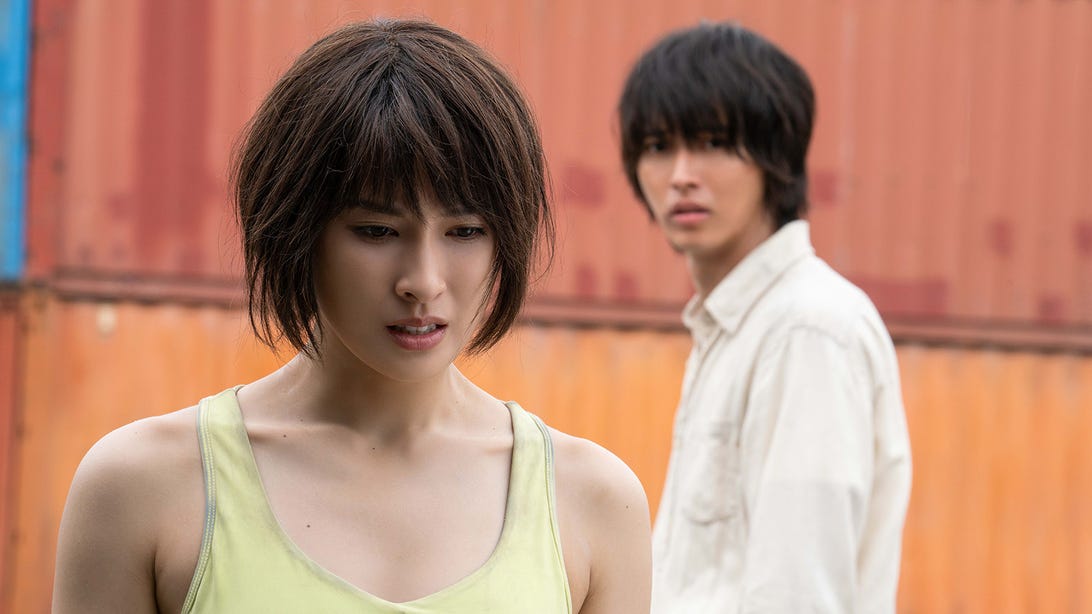
Tao Tsuchiya and Kento Yamazaki, Alice in Borderland
NetflixReturning to the Real World
Because Usagi brought Arisu back from his hallucination, he completed the third round of croquet and, at last, all the games are cleared. Mira is lasered to death and all the remaining players are now presented with an option: Accepting "permanent residence" in this land or rejecting it. Once the survivors give their responses — everyone rejects the offer besides the two characters we met in the Jack of Hearts game, Banda and Yaba — we finally learn the truth about this alternate world.
The answer was in the title all along: "Borderland" is a place where you go when you're at the border of life and death. You know how people often ask what happens to survivors of near-death experiences? Alice in Borderland has imagined an answer to that question. After the players reject permanent residence, the show takes us back to that day from the first episode. But this time, not only are Arisu, Karube, and Chota at Shibuya Crossing in Tokyo, the other main characters — from Usagi to Chishiya (Nijiro Murakami) to Kuina (Asahina Aya) — are there, too. And here's the big reveal: a meteorite struck Tokyo on that day. Arisu's heart stopped for a whole minute, as did many of the others who ended up in the games. It's suggested that within that minute, all of these characters whose hearts stopped had a collective experience where they're in "Borderland," fighting for a second chance at life.
Then, the most devastating part of the reveal: a news reporter announces the list of victims from the meteorite disaster. They include Karube and Chota, and many characters who died in the alternate world including Tatta, Shibuki, and Momoka. It quickly becomes obvious that the people who perished in the games passed away in real life, and the ones who made it until the last game was cleared woke up after their hearts started beating again. The manga reveals more about the scale of this incident — 2,000 people died, and 25,000 were injured.
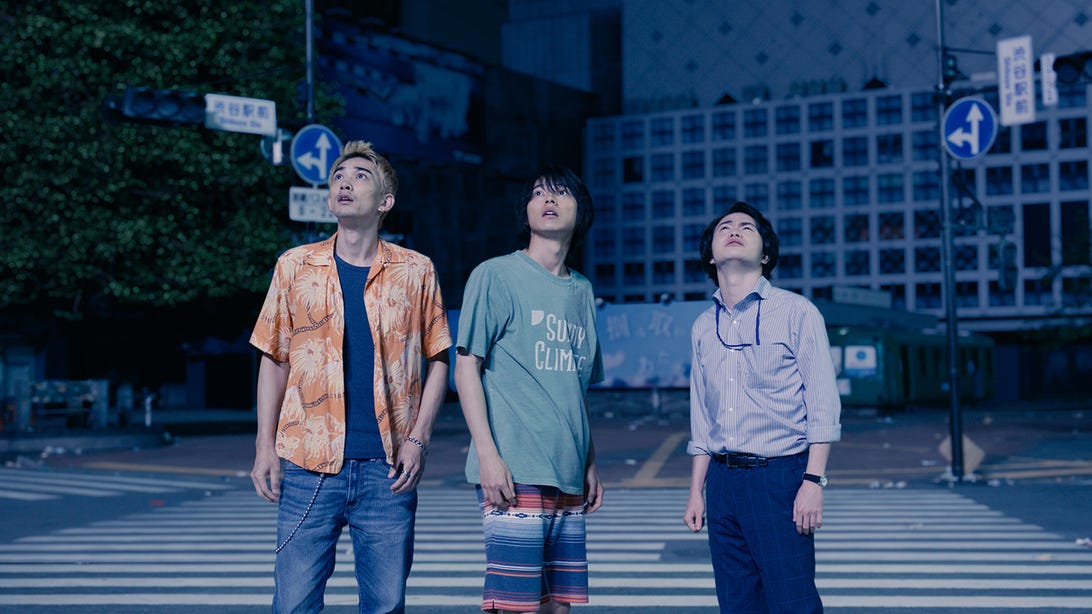
Keita Machida, Kento Yamazaki, Yuki Morinaga, Alice in Borderland
NetflixArisu wakes up in a hospital thinking about Karube and Chota, and we have good reason to believe that this is the real world he's been dying to return to. His younger brother — whom he has not seen since being transported to the alternate Tokyo — is next to him, and they talk about their dad with whom Arisu has had a strained relationship. Arisu has no memory of what happened in Borderland, which is definitely disappointing for us considering how much he went through there. But we learn a little about the impact the games had on the survivors. Chishiya and Niragi (Dori Sakurada) are also bedridden at the hospital, and Chishiya asks Niragi if he will live differently. "Since I've wasted my life until now, I think I'll be able to live a more useful life from now on," Chishiya says.
And even though the survivors don't remember the events of Borderland, some have lingering feelings about the relationships built there. For instance, Heiya is outside of Aguni's hospital room as he lies unconscious. A nurse asks her if she's a friend of his and she says no, but it's obvious that she's drawn to him for some reason. There is of course also the scene with Arisu and Usagi meeting for what appears to be the first time in this reality, in front of the vending machine. "Have we met somewhere?" Arisu asks Usagi. She says no (I guess only one of them has lingering feelings???), but the pair strike up a conversation and take a walk together.
Another parallel between the two worlds is that whatever injury a character got in the meteorite disaster, they suffer from it in Borderland, too. Heiya is in a wheelchair in the hospital, and we saw that her leg was amputated after one of the games. Niragi's face was covered in burns this season, and the scene of him back in real life shows the same wounds.
What exactly is the show trying to say with this ending? There are many possible interpretations, but here's ours: While Arisu was stuck in his Mira-induced hallucination, Usagi tells him to stop searching for "the reason for living."
"The answer is different for everyone," she says. "A reason for living... it doesn't matter if you have one or not." Ever since Karube and Chota died in the Seven of Hearts game, Arisu has been asking why he lived instead of them — and believing that he should not have. For most of the show, Arisu has seemingly believed that his life is worthless unless he found a clear answer to this question of why he survived. The ending suggests that that shouldn't be the case. Arisu's life has value whether or not he finds the answer he's looking for — there's so much to gain from the journey of living even if the reason for it isn't obvious.
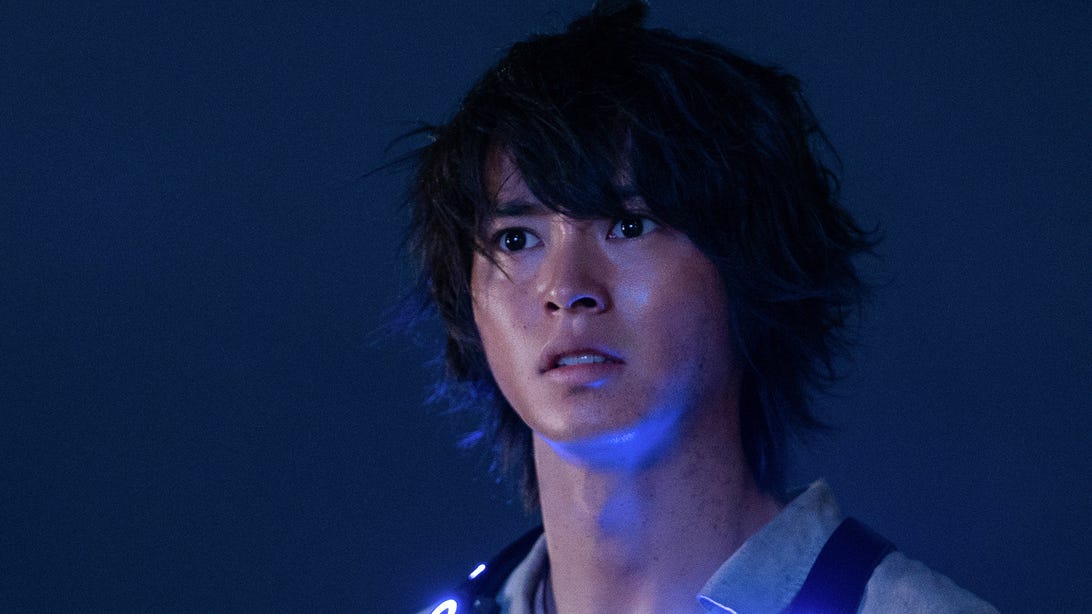
Kento Yamazaki, Alice in Borderland
NetflixIn the manga, one of the last scenes is Arisu asking his brother about going to college. If you remember, at the start of the series Arisu is an unmotivated high school student who spends most of his time gaming. Surviving this near-death experience, no matter how much he remembers from Borderland, has given him a new drive. The manga also has more of a satisfying ending than the show. In the final panels — set two years after the meteorite disaster — Arisu is on the phone talking about his hope to study clinical psychology. He begins to make weekend plans with the person he's calling, and groans when he hears about a trip to the mountains. "Please, this time, could we go somewhere more tailored toward beginners," he says. We don't see who he's talking to, but it's hard to imagine anyone besides our resident climber Usagi. Even though they met in a different way in this reality, the two have formed a bond hopefully as deep as the one in Borderland.
Meanwhile, what is up with the show's final scene? There is a deck of cards on a table outside the hospital building, and the final shot zooms in on the joker card. While this can be interpreted as the entire ending about the meteorite disaster being an extension of the games (please no), we're going to think of it another way for our sanity. An explanation could be that the deck of cards is there so that when Arisu — or anyone who survived Borderland — sees the joker card, it will prompt them to remember what they experienced in that one minute when their hearts stopped.
